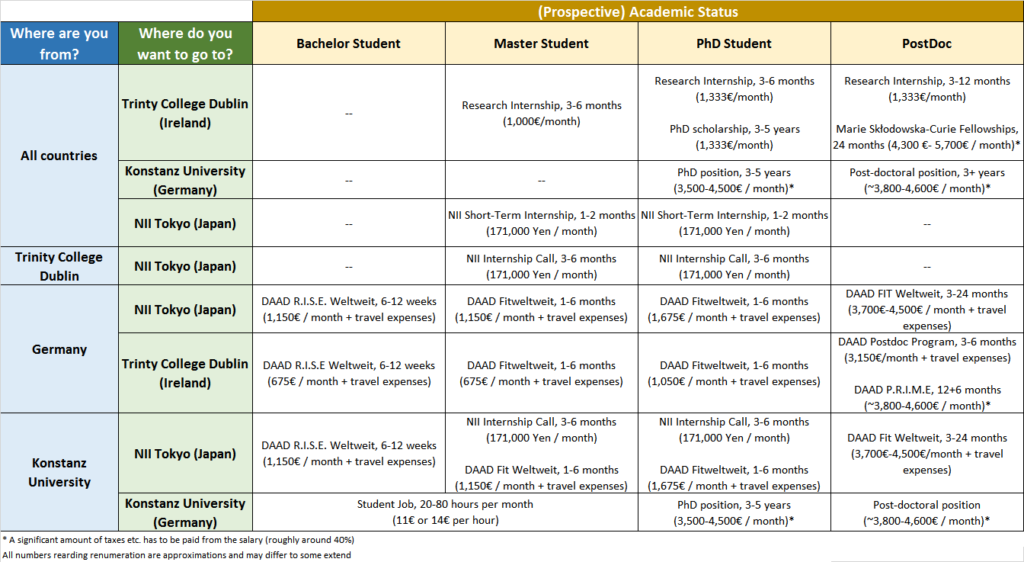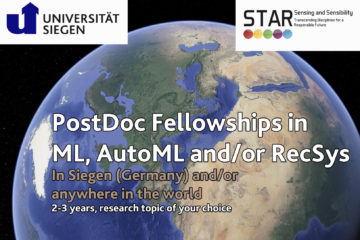Update on 2018-03-15: We Are Hiring 1 Software Engineer & 1 Software Architect / Product Owner for a Recommender-System Business Start-up
Updated on 2017-08-14: Here at Docear and Mr. DLib we have many exciting projects in the field of recommender systems, user modelling, personalisation, and adaptive systems (primarily with a focus on digital libraries but we are also open for domains such as health care, transportation, and tourism). If you are interested in pursuing any of the projects as part of a Bachelor, Master, or PhD thesis, as a post-doctoral researcher, or as a short-term research internship, read on.
The projects
We have a number of interesting projects but please consider the following list only as a suggestion. If you have your own ideas, you are very welcome to discuss them with us. In general we are interested in anything relating to user modelling, personalization, and recommender systems in the domains of digital libraries, tourism, health care, and transportation. However, our recommender systems and reference management tools are real-world applications — hence, we are also interested in topics such as software design and architecture, scalability, parallelization, and databases.
Whatever project you choose, we can guarantee that you will be working on a real-world software system being used by tens of thousands of researchers around the globe. You will gain valuable insights into research and software development that will help you in both, pursuing a career in the industry and academia.
Mr. DLib
Mr. DLib is our new project that offers literature recommendations as a service. The service is currently used by our pilot partner GESIS and JabRef, and further partners are soon to come. Mr. DLib delivers more than 10,000 recommendations per day, which is ideal for conducting research about recommender systems. Actually, a lot of current research in the domain of (literature) recommender systems suffers from artificial lab scenarios and little relevance for real-world applications. When you conduct your research about recommender systems with Mr. DLib you can be sure that your results will have a high practical relevance and help to shape the way academics receive recommendations in the real word.
A Novel Recommendation Approach for Scientific Recommender Systems
There are more than 90 approaches to give research-paper recommendations. Your goal will be to develop a novel research-paper recommendation approach that is more effective than those ones currently being available. To achieve the goal, you will be integrating some of the existing approaches into Mr. DLib’s “Recommender System as a Service”, and either develop a completely new approach, or enhance the existing ones. We have many ideas how existing approaches could be enhanced. For instance, the ranking process could be improved by using Scientometrics (e.g. citation counts of papers, h-index, …) or machine learning, and there are many options more that we are happy to share with you in a personal discussion.
Reproducibility in Recommender-System Research
The reproducibility of experimental results is the “fundamental assumption” in science, and the “cornerstone” for drawing meaningful conclusions. Recently, we found that reproducibility is rarely given in the recommender-systems community, particularly in the research-paper recommender-system community. In a review of 90 research-paper recommender systems, we identified several cases in which only slight variations in the initial setup of the evaluation or approaches led to surprisingly different results.
We want to find out, how recommender systems should be ideally implemented and evaluated to ensure reproducible results. To achieve the goal,
- you will implement a number of research-paper recommendation approaches (or simply use some existing ones),
- then these approaches will be used to give recommendations to the users of the applications that use Mr. DLib’s recommender system (GESIS, JabRef, Docear, and maybe others)
- you will analyze how the recommendation approaches perform in the different scenarios and you try to identify the factors that affect the recommendation effectiveness. This includes making controlled changes to the algorithms and applications that display the recommendations.
If you are interested in this project, please have a look at our paper that was published in the journal “User Modeling and User Adapted Interaction (UMAI)”. The paper gives you a detailed overview on the topic of reproducibility. Your task would be to continue what we outlined in that paper.
Docear
Docear is a reference manager, comparable to tools like JabRef, Endnote, Zotero, or Mendeley. In the past year(s) the development of Docear paused somewhat, but we would love to have someone who brigs new life to the project. There are many things to do, like updating the code base to the latest Freeplane and JabRef versions, developing a web-based version, or creating a new workspace concept. Of course, there is also lot’s of research to do. For instance, you could analyze how researchers are using mind-maps to manage literature, or work on modelling the user’s interests.
Prerequisites (Required Skills)
For any of the projects you need the following skills
- JAVA
- Linux
- Databases (mySQL)
- English proficiency (oral and written)
- Academic Writing
Skills in the following areas are a plus
- Recommender Systems
- Machine Learning
- Tomcat
- Apache Lucene/Solr
- Apache Mahout
- JAVA Jersey
- Non-SQL databases (especially graph databases such as neo4j)
- Web Services
- XML
- JSON
- JIRA and Confluence
- Git/GitHub
- Social Network Analysis
- Distributed File Storage
- PDF processing
- Web Crawling
- Web Technologies
- Other programming languages including C/++/#, Python, or JavaScript
- WordPress
The Locations & Supervisors
Trinity College Dublin (TCD), Ireland / Prof. Joeran Beel
Trinity College Dublin is Ireland’s most prestigious university and among the top universities in Europe. It is located directly in the city center with a beautiful campus. Trinity College retains a tranquil collegiate atmosphere despite its location in the centre of a capital city (and despite it being one of the most significant tourist attractions in Dublin). This is in large part due to the compact design of the college, whose main buildings look inwards and are arranged in large quadrangles (called squares), and the existence of only a few public entrances [1].
Your supervisor at Trinity College Dublin will be Joeran Beel, founder of Docear and Mr. DLib. Joeran is Assistant Professor of Intelligent Systems in the school of computer science and statistics. He is also affiliated with the ADAPT Centre, which is a research centre closely cooperating with industry partners such as eBay, Intel, Microsoft, and PayPal. Joeran’s research focuses on recommender systems: recommendations as a service, recommender-system evaluation, and user modelling in the domain of digital libraries. Joeran has published three books and over 60 peer-reviewed papers, and has been awarded various grants for research projects, patent applications, and prototype development as well as some business start-up funding. He is involved in the development of several open-source projects such as Docear, Mr. DLib, JabRef, and Freeplane. Joeran founded two successful IT start-ups and received multiple awards and prizes for each. He studied and researched in Australia (Sydney), the US (Berkeley), Germany (Magdeburg & Konstanz), Cyprus (Nicosia) and England (Lancaster). He has a M.Sc. in Project Management, a M.Sc. in Business Information Systems and a Ph.D. in Computer Science. Prior to TCD, Joeran worked as IT product manager in the tourism industry (Munich, Germany), and as post-doctoral researcher at the National Institute of Informatics in Tokyo, Japan.

Source: https://upload.wikimedia.org/wikipedia/commons/6/65/Trinity_College_Dublin%2C_Parliament_Square.jpg
Dublin is the capital city of Ireland. Its vibrancy, nightlife and tourist attractions are renowned and it is the most popular entry point for international visitors to Ireland. It’s disproportionately large for the size of Ireland with nearly two million in the Greater Dublin Region – well over a third of the Republic’s population! The centre is, however, relatively small and can be navigated by foot, with most of the population living in suburbs. Being subject to the moderating effects of the Atlantic Ocean and the Gulf Stream, Dublin is known for its mild climate. Contrary to some popular perception, the city is not especially rainy. [2]
Konstanz University, Germany / Prof. Bela Gipp
The University of Konstanz (German: Universität Konstanz) is a university in the city of Konstanz in Baden-Württemberg, Germany. It was founded in 1966, and the main campus on the Gießberg was opened in 1972. The University is situated on the shore of Lake Constance just four kilometers from the Swiss border. As one of eleven German Excellence Universities, University of Konstanz is consistently ranked among the global top 250 by the Times Higher Education World University Rankings. In 2016 it was ranked 7th globally by the Times Higher Education 150 under 50 rankings. It is often referred to as “small Harvard” by the German media. [3]
Your supervisor at Konstanz University would be Bela Gipp. Bela Gipp serves as Juniorprofessor in Information Science at the University of Konstanz, Germany. Prior this, he was a post-doctoral researcher at the University of California Berkeley and at the National Institute of Informatics in Tokyo. From 2009 to 2013 he received an invitation from the University of California Berkeley, to conduct his doctoral research at the School of Information and the Department of Statistics, while being an external doctoral student at the University Magdeburg, Germany. He received his Ph.D. in Computer Science with distinction. His research interests are information retrieval and visualization, knowledge management systems and web technologies. His recent work focuses on developing semantic methods that analyze links, citations and other language independent characteristics to improve recommender systems and plagiarism detection software. He also researches the use of mind maps for different knowledge management tasks. He has published over 40 articles, three books and filed four patents. As a founder of SciPlore he develops the open-source software Docear. Starting at the age of 16, he won several prizes at Jugend Forscht, Germany’s premier youth science competition. The German Chancellor honored him after winning the 1st place in the state-level round three times in a row. Today, he acts as a jury member for Jugend Forscht. Scholarships allowed him to study abroad in Sydney, Beijing, and at UC Berkeley. After obtaining his Master of Science in Information Systems and a Master of Business Administration (MBA), he worked for the VLBA-lab, a joint venture of the SAP AG and the University Magdeburg. He has taught at the universities in Berkeley, Magdeburg and at the University of Applied Sciences HTW Berlin. He volunteered in rural China and India, teaching math and computer science, as well as at Syria’s Wadi International University. In his spare time he enjoys photography.
National Institute of Informatics (NII), Tokyo, Japan / Prof. Akiko Aizawa
The National Institute of Informatics (国立情報学研究所 Kokuritsu Jōhōgaku Kenkyūjo, NII) is a Japanese research institute created in April 2000 for the purpose of advancing the study of informatics. This institute is also devoted to creating a system to facilitate the spread of scientific information to the general public. The NII is the only comprehensive research institute in Japan in informatics. It also oversees and maintains a large, searchable information database on a variety of scientific and non-scientific topics called Webcat. [4]
Your supervisor at NII would be Prof. Akiko Aizawa (and Joeran Beel would be the co-supervisor). Akiko Aizawa is member of the Digital Content and Media Sciences Research Division at NII and works in the field of recommender systems, citation and content analysis as well as math retrieval. Akiko Aizawa has successfully supervised many students from the University of Konstanz and was also the supervisor of Joeran Beel and Bela Gipp during their time at NII.
Funding Options
Overview
In the following we list various options for funding your research. However, please note that if you are aware of some other funding options (maybe some research programs by your university or national research council), you are very welcome to discuss these options with us. And, of course, you can always apply for a non-paid internship or contact us for a research cooperation.
PhD Scholarship at Trinity College Dublin, Ireland (All Nationalities)
The yearly compensation for a PhD student is 16,000€ plus tuition fees and some extra benefits (e.g. laptop). If you are interested in this position, please apply.
Deadline for Application: Open until a suitable candidate is found
EDGE Postdoctoral Marie Skłodowska-Curie Fellowship at Trinity College Dublin, Ireland (All Nationalities)
The ADAPT Centre is a research centre that combines the world-class expertise of researchers at four universities (Trinity College Dublin, Dublin City University, University College Dublin and Dublin Institute of Technology) with that of its industry partners to produce ground-breaking digital content innovations. Recently, the ADAPT Centre – in cooperation with further research centres and universities – has secured funding for 71 Marie Skłodowska-Curie Postdoctoral Fellowship in Ireland as part of the EDGE COFUND action. These fellowships allow postdoctoral researchers to pursue their own research project over a period of two years at one of the participating research centres, under guidance of a supervisor and an industry partner.
If you are an experienced postdoctoral researcher, who would like to pursue a research project independently in Ireland, in cooperation with Joeran Beel as supervisor and an industry partner, have a look at http://edge-research.eu for more information.
Begin: April 2018
Deadline for application: November 1st, 2017
PhD position at Konstanz University, Germany (All Nationalities)
In Bela Gipp’s group are several available PhD positions for 3 years with an option for extension. Salary will be based on Germany’s TVL13 or TVL14 salary scheme for the public sector. There are also some PhD scholarships available with a compensation roughly between 1150 and 1600 Euros. If you are interested in this position, please apply.
Post-doctoral position at Konstanz University, Germany (All Nationalities)
Some of the PhD positions at Konstanz university (see above) might also be given to postdoctoral researchers, also on a TVL13 or TVL14 salary scheme for the public sector. The position would be for 3 years with an option for extension. If you are interested in this position, please apply.
DAAD R.I.S.E Weltweit (German Bachelor Students to Tokyo or Dublin)
The DAAD R.I.S.E Weltweit program allows German Bachelor students to conduct a research project abroad. We have two projects to offer, one in Tokyo, one in Dublin and both projects are about improving Mr. DLib’s recommender system. To see the project descriptions sign up, log-in, and then search in the DAAD database for Software Engineering projects in Japan or Ireland.
DAAD FITweltweit (German Master and PhD Students to Tokyo and Dublin)
DAAD FITweltweit for German Master and PhD students allows you to pursue a research project at the NII in Tokyo or the Trinity College Dublin. Applications are possible at any time. If you are interested in this position, please apply.
DAAD FITweltweit PostDoc (German Post-Doctoral Researchers to Tokyo)
The DAAD FITweltweit program for postdocs is certainly one of the most attractive fellowships at all. It allows you to pursue a research project of your choice at the NII in Tokyo with a highly competitive remuneration (at least 3700€ per month, tax free, and if you are married or have children you get some extra remuneration). The fellowship also includes an additional budget that allows you to pay a Master or PhD student to work for you. Both Prof. Bela Gipp and Prof. Joeran Beel successfully applied for this scholarship and we can support you with your application. Applications are possible at any time. If you are interested in this position, please apply.
DAAD P.R.I.M.E (German Post-Doctoral Researchers to Dublin)
DAAD P.R.I.M.E is a competitive fellowship that allows you conducting a 12 months project at the Trinity College Dublin, and then stay an additional 6 months at a German university. During the whole time you will be employed by the German host university and be paid according to the TVL13 salary scheme. The German host university could be Konstanz University or any other university you like. The program usually has a call for applications once per year. If you are interested in this position, please apply.
DAAD Postdoc Programm (German Post-Doctoral Researchers to Dublin)
The DAAD Postdoc programm (Kurzstipendium) allows German post-doctoral researchers to conduct a research project at Trinity College Dublin, for 3 to 6 months. There is also a similar program for 7 to 24 months but it is currently restructured. The compensation is around 2500€ per months. If you are interested in this position, please apply.
Student Jobs at Konstanz University, Germany (Local Students Only)
At Konstanz university, we usually have some open positions for local students who are interested in working 20 to 80 hours per months. If you are interested in this position, please apply.
NII Internship Call (Students of TCD and Konstanz University to Tokyo)
The NII in Toyko offers 3-6 months internships for Master and PhD students. Usually, there are two calls per year and only students from selected universities may apply (Trinity College Dublin and Konstanz University belong to these selected universities). The monthly compensation is 171,000 Japanese YEN) and you will be supervised by either Joeran Beel or Bela Gipp and a local supervisor at NII (probably Prof. Aikiko Aizawa). If you are interested in this position, please apply.
Application & Contact
If you are interested in any of the positions, then:
- Find out, which funding options are suitable for you
- Send the following information to joeran dot beel at adaptcentre dot ie
- The standard information such as current academic status, which position do you apply for, when do you want to start, …
- Brief letter of motivation (explain in which project you want to participate and why)
- CV
- A list that specifies for each of the above listed requirements, how good your knowledge is (e.g. JAVA: Excellent; Linux: Basic; Databases: Good; …)
- If you have: List of publications and software projects you contributed to; link to Google Scholar profile and GitHub page or similar.
- We will get back to you with further information as soon as possible.
If you have any questions, please send an email to joeran dot beel at adaptcentre dot ie.
[1] Paragraph copied from https://en.wikipedia.org/wiki/Trinity_College,_Dublin
[2] Paragraph copied from http://wikitravel.org/en/Dublin
[3] Paragraph copied from https://en.wikipedia.org/wiki/University_of_Konstanz
[4] Paragraph copied from https://en.wikipedia.org/wiki/National_Institute_of_Informatics





1 Comment
Alaa · 10th February 2017 at 21:11
Dear respected;
I am a Jordanian, second year PhD student at University of Ottawa, Canada. My research interest is in Recommender systems. I am so interested in your projects and I wonder if you still have positions available for international students?
If there are some positions available, is there any possibility to make collaboration between us (me and my supervisor) and you?
I am waiting to hear from you, and I hope that I will receive positive response!
Best regards
Alaa